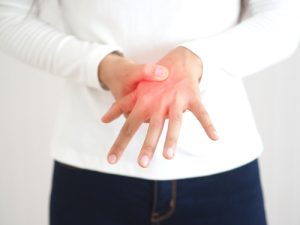If you have psoriatic arthritis, you may be curious as to whether this condition can interact with menopause. Menopause and psoriatic arthritis can greatly affect each other, but there are things that you can do to help minimize some of the issues that may come up.
Early Menopause
Typically, a woman goes through menopause between the ages of 45 to 55. However, if you suffer from psoriatic arthritis, you may find yourself going through menopause at an earlier age. Studies have shown that women could experience premature ovarian failure before the age of 40 or go into menopause before age 45.
Osteoporosis Risk
When it comes to protecting your bones, estrogen plays a role. However, when you reach menopause, your body will stop producing the necessary levels of estrogen. This will increase your chances of developing osteoporosis. Since you have chronic inflammation from PsA, this will increase the chances further. There are several pre-inflammatory proteins that are found in psoriatic disease that are also found in people with osteoporosis.
 Psoriatic Flares May Get Worse
Psoriatic Flares May Get Worse
There are several triggers that can cause psoriasis and arthritis flares. Things like infections, smoking, alcohol use, skin trauma and stress can all increase the likelihood of a flare-up. When you are in menopause, you will have fluctuations in your hormones that may cause your arthritis to flare. It is also thought that a reduction in estrogen may also cause flare-ups.
How to Manage Both Psoriatic Arthritis and Menopause
Managing your symptoms of both psoriatic arthritis and menopause will help you be as comfortable as possible. Here are a few ideas that may help you.
- Stress: Stress can trigger your psoriasis, so you will want to do all that you can to cut out stress. While it is not always easy to eliminate stress, doing things like yoga and meditation can help you relax. You may also want to talk to a therapist and find techniques to help you manage stress better.
- Improving your sleeping habits: Sleep disruptions are common during menopause, and lack of sleep can trigger your PsA. Create a sleep schedule that works for your needs. You will also want to make sure that you make your bedroom for sleep only and make it as comfortable as possible. If you continue to have trouble sleeping, you should see your doctor.
- Getting enough exercise: To keep your psoriatic flares at bay, you should do some exercise, like walking or swimming. This type of exercise can help protect you from flares and can reduce the risk of osteoporosis.
- Eating healthy: Eating a healthy diet can help you reduce flares and improve your menopause symptoms. Try to eat a diet that is anti-inflammatory. Eating plenty of fruits, vegetables and whole grains while cutting out refined sugars will help your body have less inflammation.
- Visit your doctor: Speak with your doctor about how you can treat your menopause and PsA symptoms. They may be able to recommend medications or other lifestyle modifications to help you with your symptoms.
Living with psoriatic arthritis and menopause can be difficult, but if you make some lifestyle changes and work with your doctor, you can minimize flare-ups and the symptoms of your menopause.

 Psoriatic Flares May Get Worse
Psoriatic Flares May Get Worse



